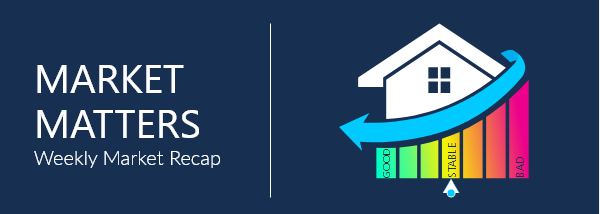Market Matters

This week, the market was dialed into Jackson Hole and the Fed as Powell spoke Friday morning. Powell gave a speech that the market for the most part was expecting, with Powell saying that restrictive policy will be required for 'some time', which has been the message of a lot of the Fed speak we have been hearing since the last Fed meeting. From here the market will watch the data come in, as the Fed will be looking to hike either 50 or 75 bps in September. Feels like we are back to data dependent with the Fed, as good data will increase the odds of them going 75, and weak data increases the odds of going 50.
 Initial Jobless Claims
Initial Jobless Claims
Initial Jobless Claims for the week ending August 20th came in at 243k, which is down from the market's expectations of 252k, and a tick down from the prior weeks revised amount of 245k. The four-week moving average rose slightly to 247k, compared to the prior week's 245.5k. This is the second week that jobless claims have fallen, which is a good sign of strength in the labor market. Continuing claims for the week ending August 13th came in at 1.415mm, which is down from the market expectations of 1.441mm and is down from the prior week's revised number of 1.434mm.
 Q2 GDP
Q2 GDP
Q2 GDP was revised from -0.9% q/q to -0.6%, which is better than what the market was expecting, which was a revision to -0.7%. Consumer spending was at 1.5%, which is what the market was expecting. The most interesting part of the report was that Gross Domestic Income (GDI) rose 1.4% q/q, which measures activity by calculating all income generated from producing those goods and services, such as compensation and company profits. "We continue to think that the decline in real GDP across the first two quarters of the year does not meet the NBER's definition of a recession, and if the GDP data are eventually revised up to be more consistent with the GDI data, the first half of the year may end up looking stronger (or at least less weak) than the data currently show," JPMorgan Chase & Co. economist Daniel Silver said in a note.
 U.S. Pending Home Sales
U.S. Pending Home Sales
U.S. Pending Home Sales for the month of July came in -1.% MoM, which is a beat compared to market expectations of -2.6%. For the year, home sales are down 22.5%, which is lower than expectations of -21.4%. This is the lowest level pending home sales have been at since the start of the pandemic. "This month's very modest decline reflects the recent retreat in mortgage rates," Lawrence Yun, NAR's chief economist, said in a statement. "Inventories are growing for homes in the upper price ranges, but limited supply at lower price points is hindering transaction activity."
 MBA Mortgage Applications
MBA Mortgage Applications
MBA Mortgage Applications for the week ending August 19th came in down 1.2%. Purchase applications are down 0.5%, and refinances are down 2.8% week over week. From a year ago, purchase and refinance applications are down 21.2% and 82.7%. "Mortgage applications continued to remain at a 22-year low, held down by significantly reduced refinancing demand and weak home purchase activity," said Joel Kan, MBA's Associate Vice President of Economic and Industry Forecasting, as "Mortgage rates increased for all loan types." Additionally, "The average purchase loan size continued to trend lower, as purchase activity at the high end of the market is weakening," he said. Specifically, the average purchase loan size declined 1.1% week over week to $406.4k and is just 3.6% higher YoY. It is well back from the survey high of $460.1k hit in mid-March and not too far away from this year's low at $401.7k, which was right at the start of 2022.

